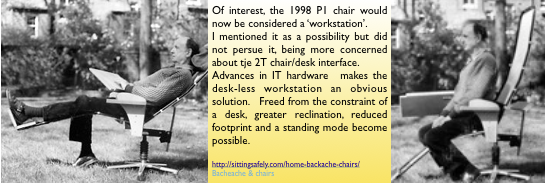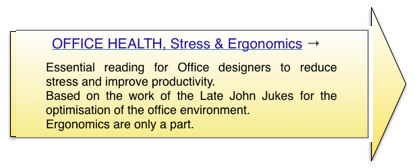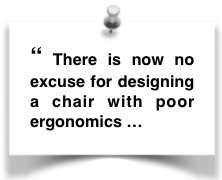 An account of the bio-mechanic (ergonomic) factors, associated with prolonged sitting, accounting for mechanical spinal pathology (Backache, LBP, IVDisc pathology, CTD) and options for their remediation.
An account of the bio-mechanic (ergonomic) factors, associated with prolonged sitting, accounting for mechanical spinal pathology (Backache, LBP, IVDisc pathology, CTD) and options for their remediation.
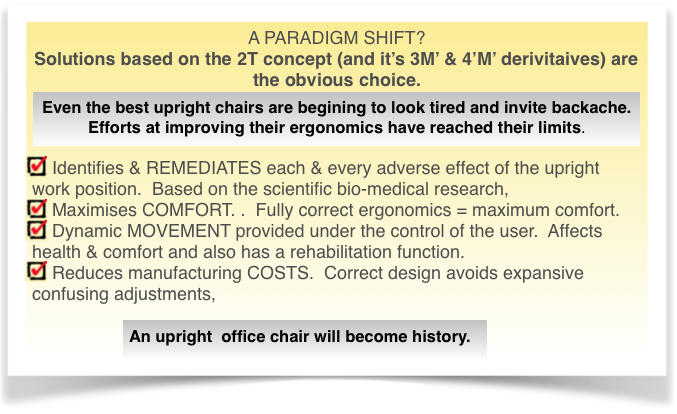
 Some essential reading for designers of ergonomic chairs and retail office chairs if they wish to improve the ‘ergonomics’ of their models with overwhelming health selling points. Chair designers still lose out, often having familiarity bias in recognising the underlying bio-mechanical essentials for a chair that will supersede the existing ‘cool’ models. ☛ Chair DESIGNERS & Low Lumbar Backache→
Some essential reading for designers of ergonomic chairs and retail office chairs if they wish to improve the ‘ergonomics’ of their models with overwhelming health selling points. Chair designers still lose out, often having familiarity bias in recognising the underlying bio-mechanical essentials for a chair that will supersede the existing ‘cool’ models. ☛ Chair DESIGNERS & Low Lumbar Backache→

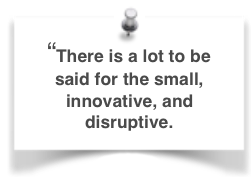 For MANUFACTURERS of retail office chairs new ideas can create both threats and
For MANUFACTURERS of retail office chairs new ideas can create both threats and
opportunities , once both familiarity and normalcy biases are overcome. Creative disruption works. A resource if they wish to improve the ‘ergonomics’ of their models with overwhelming health selling points. Manufacturers can be reassured that feasibility indicates that existing components can be used , avoiding 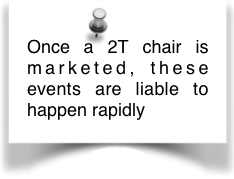 the expense of retooling, while preserving their brand image.
the expense of retooling, while preserving their brand image.
Prospective manufacturers can be helped to leap ahead of the field once their chair is shown to have optimised ergonomics. ☛ Manufacturers →

☛ For ARCHITECTS. ‘Coolness’ is the word to excite media interest for both the company and the Architect/Designer. It is very relevant to Interior designers and architects involved with office design. Most firms aspire to project this cutting edge image. A 2T chair answers this exactly and in addition reduces LBP and increases productivity by lessened morbidity and stress.(See below).

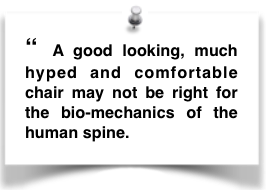 Allows an alternative view to the usual hype, often laughably misguided, from manufacturers, Office managers should consult this blog as a resource (→For OFFICE MANAGERS).
Allows an alternative view to the usual hype, often laughably misguided, from manufacturers, Office managers should consult this blog as a resource (→For OFFICE MANAGERS).
 The scientific evidence identified adverse effects which occur with conventional prolonged mid-upright sitting that required remediation.
The scientific evidence identified adverse effects which occur with conventional prolonged mid-upright sitting that required remediation.
- To avoid user backache on prolonged sitting.
A knowledge of spinal anatomy, pathology & bio-mechanics.
The effects of mid-upright sitting.
Remediation for chair design. 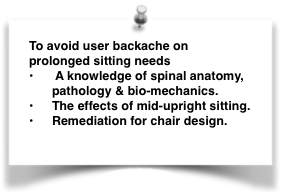 Axial compression (by gravity). (Loading→)
Axial compression (by gravity). (Loading→)- Flexion at the vulnerable spinal joints. (Effects on the upright seated posture.→)
- A combination of the above. (Effects on the upright seated posture.→)
- Constrained movement. (EXERCISE & movement →)
Backache & chairs. A number of partial systems are described.
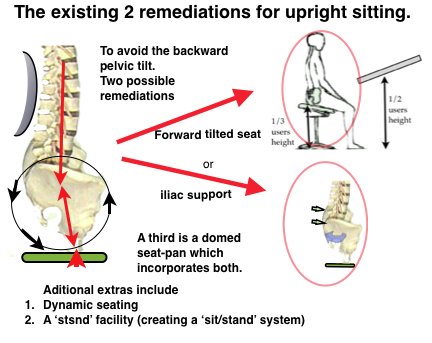
Derived from these findings are the ergonomic requirements to help remediate the adverse effect of the Upright seated mode. Essentially these are two.
If configured correctly are of some help. But these efforts to improve the ergonomics of upright chairs seems to have reached their limits without a great reduction in spinal disorders associated with prolonged sitting work. Efforts have also been made to sidestep the problem :-
- SIT/STAND (& stools)
- The OFFICE POOL (#MiniMocks) and (https://www.youtube.com/watch?v=TwQRXSvgm5o&feature=youtu.be)
The time has come to move on.
The reclined, relaxed position.
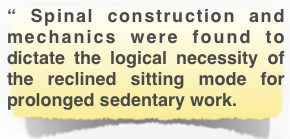 Spinal bio-mechanics dictates that a full remediation for prolonged sitting that avoids all the adverse effects of prolonged upright sitting, can only be achieved in a reclined position . This conclusion became validated by independent work using pMRI scanning (Positional MRI→) (Smith 2007). ( also this confirmed the 2Tilt (3M) concept. (Reclined mode→).
Spinal bio-mechanics dictates that a full remediation for prolonged sitting that avoids all the adverse effects of prolonged upright sitting, can only be achieved in a reclined position . This conclusion became validated by independent work using pMRI scanning (Positional MRI→) (Smith 2007). ( also this confirmed the 2Tilt (3M) concept. (Reclined mode→).
This involves a number of requirements. To be effective these are detailed in the 2T CONCEPT a full solution →. Although originally considered outlandish, recently design is now moving in this direction. WORK-CHAIRS, a new breed with a reclined mode.→

- In practice a reclined mode for prolonged work demands:-
- A fully supportive reclined mode, for prolonged work.
- An upright mode for certain short tasks.
 An easy transition mode which is preferably unstable for additional health benefits.
An easy transition mode which is preferably unstable for additional health benefits.

